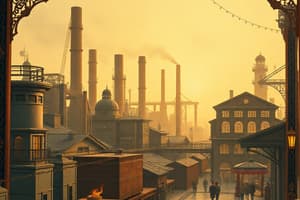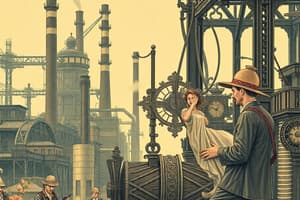Podcast
Questions and Answers
Where did 'New immigrants' between 1890 and 1920 come from?
Where did 'New immigrants' between 1890 and 1920 come from?
- Southern and Eastern Europe (correct)
- Central Europe
- Northern Europe
- Western Europe
What innovations is Henry Ford known for?
What innovations is Henry Ford known for?
assembly line and mass production techniques
Tenements were places where poor immigrants worked. (True/False)
Tenements were places where poor immigrants worked. (True/False)
False (B)
Sweat Shops were places where poor immigrants ____.
Sweat Shops were places where poor immigrants ____.
What major industries had a significant impact on life in the 1920s?
What major industries had a significant impact on life in the 1920s?
What economic practice became popular in the 1920s where Americans went into debt to buy goods?
What economic practice became popular in the 1920s where Americans went into debt to buy goods?
Who fought for the right of women to vote?
Who fought for the right of women to vote?
During which war did a great deal of money get spent and many social programs go bankrupt?
During which war did a great deal of money get spent and many social programs go bankrupt?
The Monroe Doctrine aimed to encourage European colonization of Latin America.
The Monroe Doctrine aimed to encourage European colonization of Latin America.
Who was the first African American Supreme Court Justice?
Who was the first African American Supreme Court Justice?
The ________ kept Europeans from colonizing more of Latin and South America.
The ________ kept Europeans from colonizing more of Latin and South America.
Match the following events with their descriptions:
Match the following events with their descriptions:
Flashcards are hidden until you start studying
Study Notes
Unit 7 – Industrialization/Immigration
- Between 1890 and 1920, "New immigrants" came to America from southern and eastern Europe.
- Henry Ford was known for introducing the assembly line and mass production techniques.
- Tenements were places where poor immigrants lived, while Sweat Shops were places where they worked.
- The 1920s saw a significant impact of automobiles and movies on life.
- Installment buying in the 1920s led to many Americans going into debt.
- Franklin Delano Roosevelt's New Deal expanded the role of the federal government in the economy and people's lives.
Progressive Era
- Populists and Progressives supported government regulation of business, opposing Laissez-Faire policies.
- Elizabeth Cady Stanton and Susan B. Anthony fought for women's right to vote.
- High protective tariffs encouraged American industries to grow.
- In the 1800s, the Federal Government's policy towards Native Americans was to forcefully relocate them to reservations.
- The Chinese Exclusion Act and the National Origin Act limited immigration to the US, particularly from Asia.
- Anti-Trust Laws were passed to prevent businesses from becoming too powerful.
- Reforms were made to improve women's political equality, end big business abuse, and pass the Pure Food and Drug Act.
Labor and Business
- Muckrakers, such as Upton Sinclair, exposed the dirt and corruption of big business, leading to reforms like the Meat Inspection Act.
- Progressive taxes were introduced, where the more you made, the more you paid.
- Theodore Roosevelt created National Parks and National Forests.
- Labor Unions formed due to terrible working conditions and fought for better wages and conditions.
- Corporations were able to raise large sums of money for investments.
- African Americans, originally forced to come to America, sought to achieve equality through education.
World War I and the Roaring Twenties
- The Jazz Age, Flappers, and Prohibition characterized the 1920s.
- Mass production involved interchangeable parts and the assembly line.
- The Meat Inspection Act and Pure Food and Drug Act protected consumers.
- Corporations, stocks, trusts, and monopolies were associated with the rise of big business.
- Muckrakers, Suffragettes, and Populists wanted to reform the United States.
- The 1920s saw immigration laws, such as quotas, limiting immigration from southern and eastern Europe.
Unit 8 – An Independent World
- Imperialism involved controlling areas outside one's own country for benefit.
- The US Senate rejected the Treaty of Versailles and opted for isolation after WWI.
- Many African Americans migrated from the south to the north for better jobs during WWI.
- Reasons for US involvement in WWI included the Zimmerman Note, sinking of the Lusitania, and German unrestricted submarine warfare.
Unit 9 – Between the Wars
- The 1920s saw a common culture created by the automobile, radio, phone, and motion pictures.
- FDR believed government programs could solve the nation's economic problems.
- FDR's Good Neighbor Policy affected US interactions with Latin America.
- The Social Security System was established to provide pensions for retired workers.
- FDR's New Deal policies involved hiring workers for public works projects.
Unit 10 – World Wide Responsibility
- Suburbs expanded in the 1950s due to the construction of interstate highways.
- Segregation was made illegal in the 1950s.
- The Truman Doctrine, Marshall Plan, and Berlin Airlift helped reduce the threat of Communist expansion.
- The Marshall Plan provided economic aid to European nations after WWII to prevent the spread of Communism.
Unit 11 – World War II to Present
- During the Civil War, WWI, and WWII, human rights were sometimes violated.
- Many people in the US do not want to develop nuclear energy due to its perceived danger.
- Supply and demand affect the prices of crops, with farmers earning more when supply is low and demand is high.
- The 20th century saw more leisure activities due to the Industrial Revolution.
- The Brown v. Board of Education Supreme Court decision declared segregation illegal.
- The Civil Rights Movement brought political and social gains for minorities.
Please note that this is not an exhaustive list of study notes, but rather a condensed version of the key points.
Studying That Suits You
Use AI to generate personalized quizzes and flashcards to suit your learning preferences.




